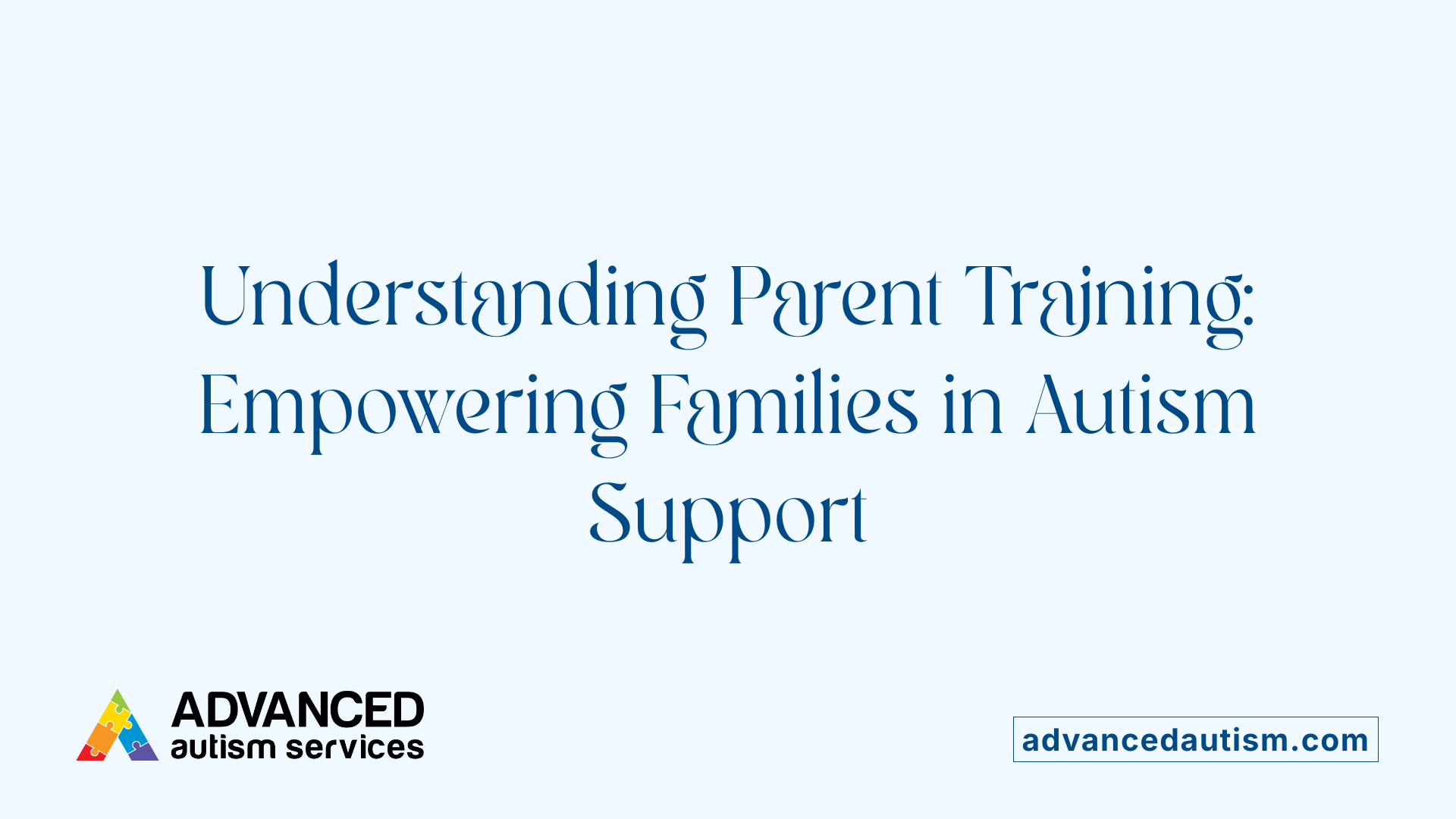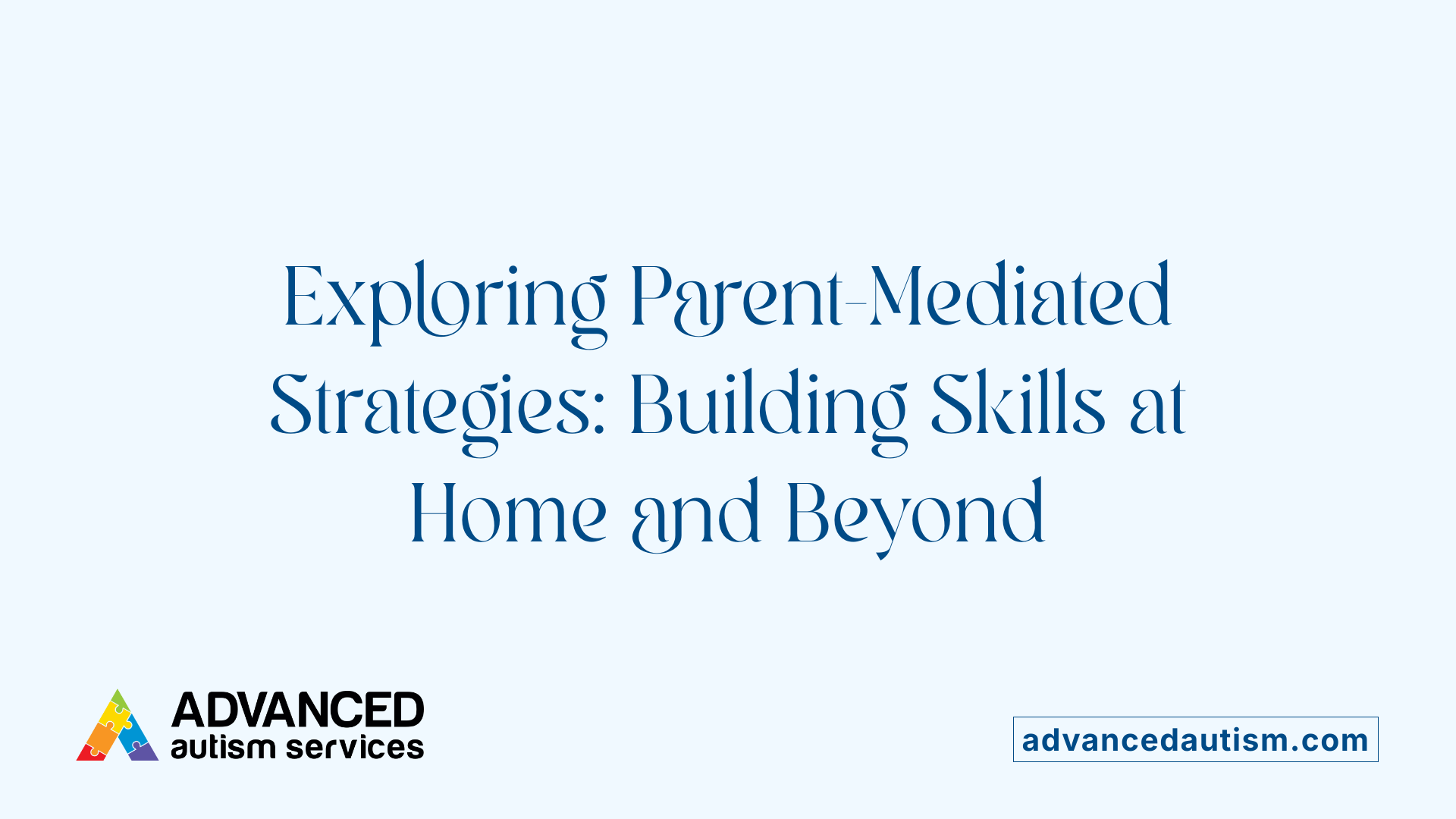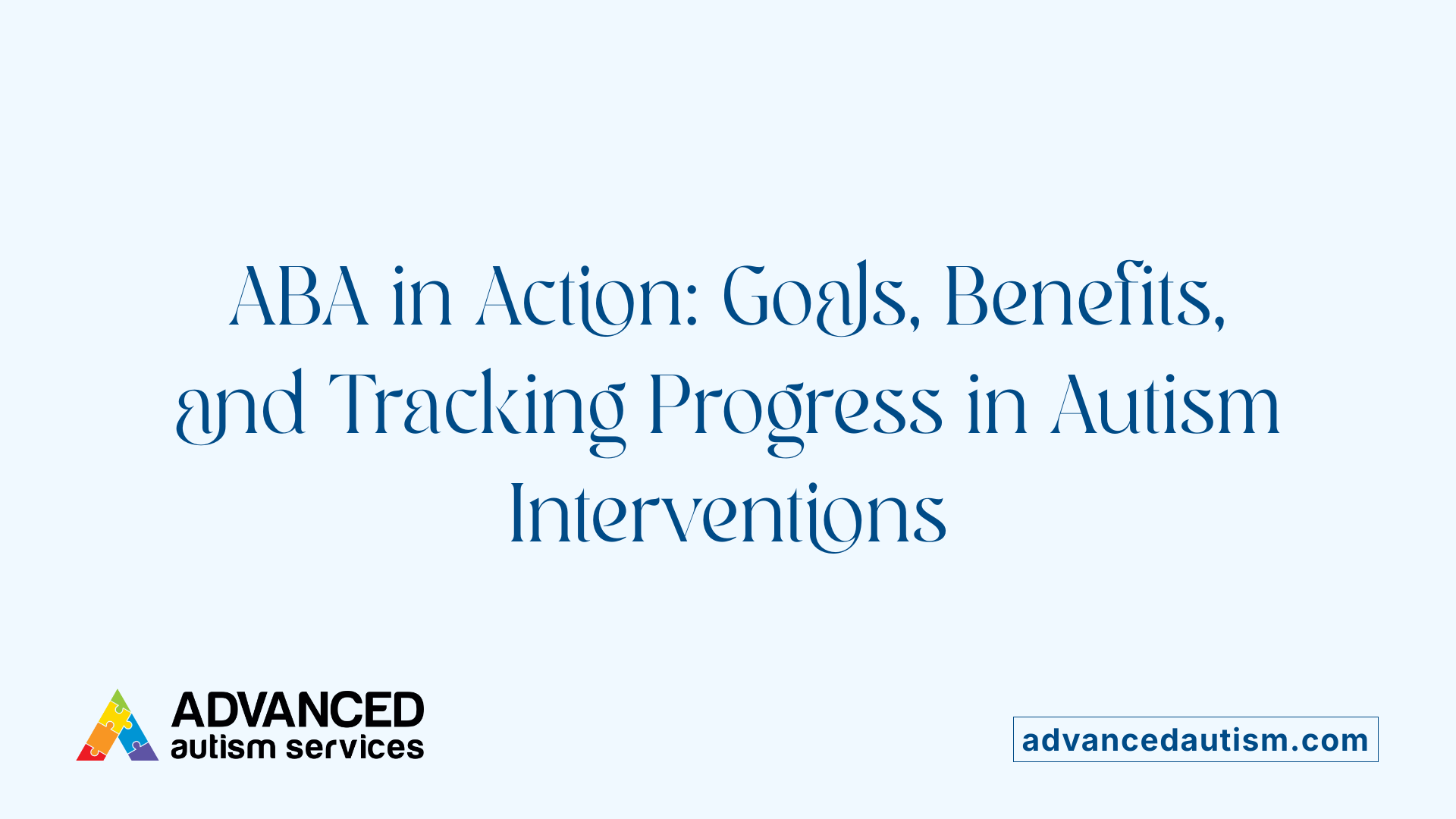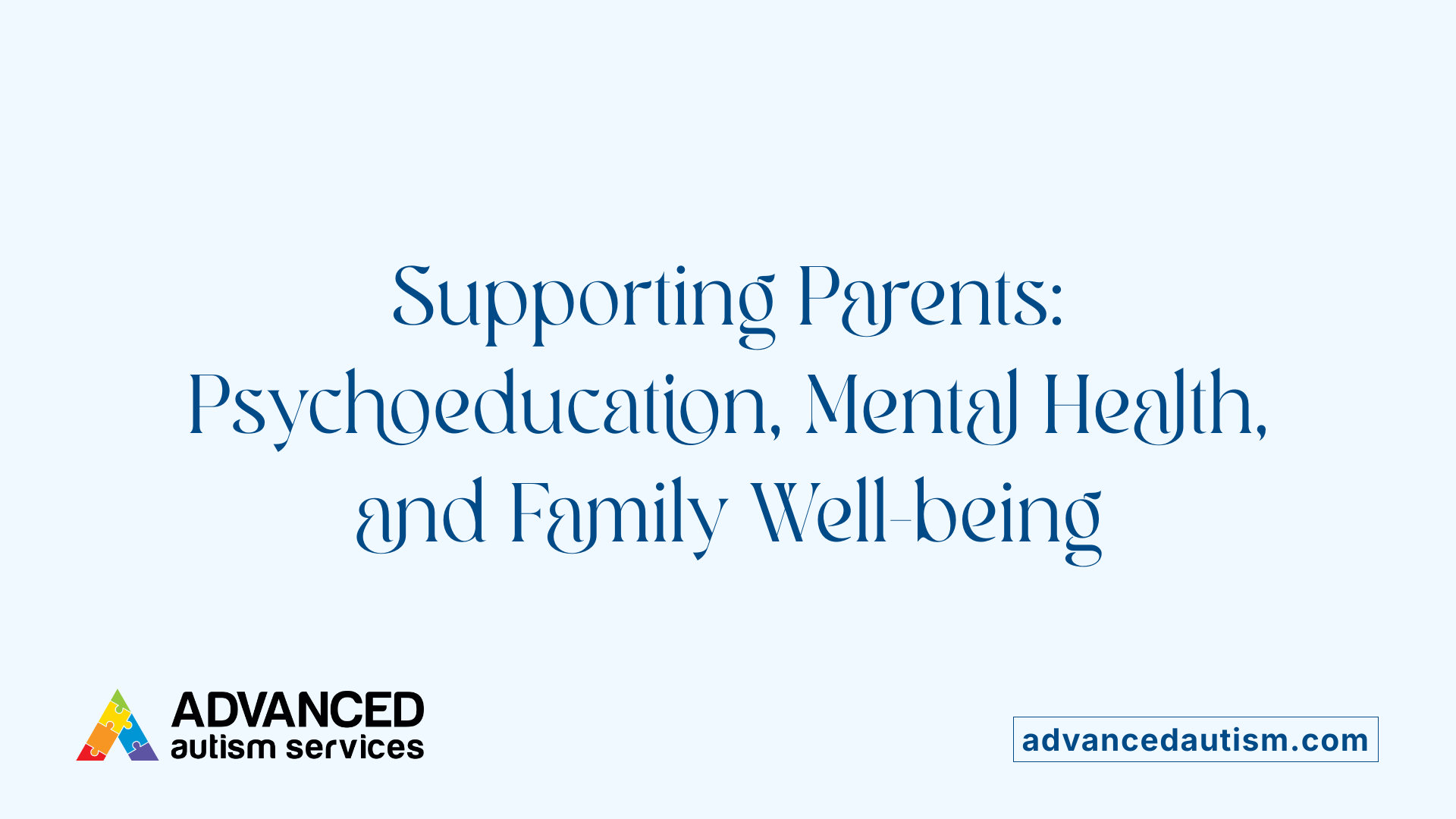Understanding Parent Training in Autism
Parent training has emerged as a vital component in autism intervention, offering parents tools and strategies to support their children’s development effectively. With autism spectrum disorder (ASD) presenting complex behavioral and social challenges, training programs empower caregivers to become active participants in their child's therapy, enhancing outcomes and fostering independence. This article explores the scope, methods, benefits, and scientific backing of parent training within autism intervention frameworks, emphasizing applied behavior analysis (ABA) and other evidence-based approaches.
Defining Parent Training and Its Role in Autism Intervention

What is Parent Training (PT) in Autism?
Parent training (PT) in autism is an evidence-based intervention that teaches caregivers specific strategies to improve their child's social interactions, communication, and behavior. Rooted in decades of research, PT empowers parents to become the main agents of change by equipping them with tools to reduce disruptive behaviors and promote skill development in their children with autism spectrum disorder (ASD). Typically delivered in weekly sessions spanning 10 to 20 weeks, PT provides structured guidance, including role-playing, homework, and follow-up, to ensure consistent and generalized application across settings.
What Range of Interventions Fall under Parent Training?
Within ASD, parent training encompasses various approaches beyond behavior management. These include care coordination, which organizes medical and therapy services to meet complex needs; psychoeducation that informs parents about ASD to set realistic expectations and improve advocacy; as well as parent-mediated interventions (PMIs). PMIs actively involve parents in promoting their child's social, communication, and behavioral skills, either as the primary interventionists or in support of therapist-led programs. Examples include the Early Start Denver Model (ESDM) and Pivotal Response Treatment (PRT).
How Do Parent Support Programs like Care Coordination and Psychoeducation Benefit Families?
Parent support programs such as care coordination and psychoeducation indirectly benefit children by empowering parents. Care coordination ensures that various healthcare providers work together smoothly, a necessity given autism's multifaceted challenges. Psychoeducation offers parents up-to-date information about ASD, assisting them in adjusting expectations, managing developmental challenges, and advocating effectively for their child's needs.
How Is Parent Training Different from Parent-Mediated Interventions?
While broadly related, parent training and parent-mediated interventions differ in focus. Parent training often centers on teaching parents behavioral management techniques to reduce disruptive behaviors and enhance communication. In contrast, parent-mediated interventions focus on parents actively facilitating core skill acquisition, such as social engagement and language development, sometimes supplementing therapist-led treatments.
Why Is Parent Training Considered an Evidence-Based Approach?
PT's evidence base is strong for managing disruptive behaviors and promoting skill acquisition in children with ASD. Studies have shown significant reductions in tantrums, aggression, and self-injury, alongside improvements in communication and compliance with parental requests. Incorporating applied behavior analysis (ABA) principles, PT uses scientifically validated methods like the Antecedent-Behavior-Consequence model to teach strategies including antecedent management, consequence-based techniques, and skill maintenance. This makes PT suitable especially for children with mild to moderate behavioral difficulties and fosters long-term benefits for both children and their families.
What is Applied Behavior Analysis (ABA) Therapy and Its Role in Autism Treatment?
Applied behavior analysis (ABA) therapy is a scientific approach that applies principles of learning and behavior to improve social, communication, and daily living skills in individuals with autism. ABA involves individualized programming, frequent data collection, and techniques such as positive reinforcement and prompting to encourage desirable behaviors and reduce harmful ones. Structured teaching methods like Discrete Trial Training (DTT) and naturalistic strategies such as Pivotal Response Treatment (PRT) are used within ABA. Recognized as a best practice, ABA has shown significant benefits in enhancing communication, social skills, and decreasing problematic behaviors in children with autism.
Components and Approaches in Parent-Mediated Interventions

What Are Parent-Mediated Interventions (PMIs)?
Parent-mediated interventions (PMIs) are strategies where parents play an active role in promoting their child's skill development or behavior change. These interventions are designed specifically for children with autism spectrum disorder (ASD), focusing on improving core areas such as socialization, communication, and managing maladaptive behaviors.
Primary Versus Complementary PMIs
PMIs can be categorized as primary or complementary. In primary PMIs, parents serve as the main agents of change, delivering interventions directly to their children. Complementary PMIs involve parents supporting a therapist-led intervention, reinforcing therapeutic strategies at home or in other settings.
Examples of PMI Programs
Several well-regarded PMI programs illustrate this approach:
- JASPER (Joint Attention, Symbolic Play, Engagement, and Regulation): Emphasizes improving joint attention and symbolic play to build foundational social skills.
- ESDM (Early Start Denver Model): A developmental model using play and social interaction based on Applied Behavior Analysis (ABA) principles targeting very young children.
- PRT (Pivotal Response Training): Focuses on pivotal areas such as motivation and self-initiation to improve broad developmental outcomes.
- RUPP Manual-Based Interventions: Structured programs that guide parent training to manage behavior problems effectively.
Areas of Focus
PMIs prioritize fostering social communication skills like shared attention and vocalization as well as reducing maladaptive behaviors like tantrums or aggression. These efforts help children engage better in social settings and progress in language abilities.
Integrating Parent Training With Developmental and Behavioral Models
Parent training often blends developmental approaches (which address specific skills) with behavioral techniques grounded in ABA. This combination supports parents in applying consistent strategies across different settings, enhancing the child's learning and adaptability.
Through these varied components and models, PMIs empower parents as essential collaborators in their child’s early intervention, demonstrating promising outcomes in ASD management.
The Science Behind ABA and Its Providers

ABA Therapy Providers and Their Qualifications
ABA therapy is delivered by various trained professionals, primarily including Board Certified Behavior Analysts (BCBAs), behavior technicians, and therapists specialized in applied behavior analysis. Each provider's qualifications and roles vary to ensure comprehensive treatment delivery.
Board Certified Behavior Analysts (BCBAs)
BCBAs usually hold a master's degree in applied behavior analysis, psychology, or a related field. Achieving BCBA certification requires completing extensive supervised fieldwork and passing a credentialing exam. BCBAs are responsible for designing individualized ABA programs, supervising staff, assessing progress, and adjusting interventions based on data-driven analysis.
Behavior Technicians and Therapists
Behavior technicians or ABA therapists often have a high school diploma or an undergraduate degree supplemented with specialized training in ABA techniques. They implement therapy sessions directly with children, following the treatment plans developed by BCBAs. Their work includes collecting data during sessions and providing feedback to ensure fidelity to intervention protocols.
Ethical Standards and Training
All ABA providers adhere to ethical standards set by bodies such as the Behavior Analyst Certification Board (BACB). Ongoing training and supervision are essential to maintain competence and ensure interventions are delivered safely and effectively.
Structured ABA Delivery and Data-Driven Approaches
ABA therapy is structured and highly data-driven. Providers use tools such as the Antecedent-Behavior-Consequence model to analyze behaviors. They employ strategies including antecedent management, consequence-based methods, skill acquisition, and maintenance plans to promote positive outcomes.
| Provider Type | Qualifications | Roles and Responsibilities |
|---|---|---|
| Board Certified Behavior Analyst (BCBA) | Master's degree + BCBA certification | Program design, supervision, assessment, data analysis |
| Behavior Technician | High school diploma or bachelor's with ABA training | Direct therapy implementation, data collection |
| Licensed Therapist | Licensed in relevant field + ABA training | Therapeutic interventions, parent training, collaborative care |
ABA therapists play a vital role in delivering effective interventions by combining formal education, certification, supervised experience, and adherence to ethical practices to improve outcomes for children with ASD.
Goals, Benefits, and Measurable Outcomes of ABA-Based Parent Training

What are the key goals and benefits of ABA therapy for individuals with autism?
Applied Behavior Analysis (ABA) therapy aims to enhance communication, social, and daily living skills for individuals with autism. It works to reduce problematic behaviors, thus supporting more positive social interactions and independence. ABA interventions focus on increasing adaptive functioning and quality of life, enabling individuals to engage more effectively in education, social settings, and the community.
Parents involved in ABA-based training become empowered as primary change agents, learning how to promote their child's development through consistent reinforcement and natural learning opportunities. This approach not only advances the child's skills but also strengthens parent-child relationships and reduces challenging behaviors. Early and personalized ABA techniques help children improve language and socialization abilities, facilitating fuller participation in typical daily activities.
How is the effectiveness of ABA therapy typically measured?
Effectiveness is tracked through continuous data collection on targeted behaviors and skills using both qualitative and quantitative measures. Several standardized tools are widely used:
| Assessment Tool | Focus Area | Description |
|---|---|---|
| Vineland-3 | Adaptive skills | Measures communication, daily living, socialization, and motor skills. |
| | VB-MAPP | Verbal and behavioral skills| Evaluates language and social skills development for children with autism.| | | BHCOE ABA Outcomes Framework™ | Comprehensive outcomes framework | Provides guidelines for selecting reliable and valid assessments for ABA progress.| |
Further, the Patient Outcome Planning Calculator (POP-C) supports treatment planning by predicting dosing and progress based on individual characteristics.
Ongoing evaluation allows therapists and parents to adjust interventions according to the child's responsiveness. The combination of structured assessments and data-driven decision-making ensures that ABA therapy remains effective and responsive to each child's unique needs.
Benefits for both children and parents
ABA-based parent training delivers improvements beyond the child’s behavior. Parents experience reduced stress and better mental health due to their enhanced capacity to manage challenges. The training fosters parental confidence and satisfaction through role playing, homework activities, and guided practice, further improving the caregiving environment.
Together, these aims and measurable outcomes create a comprehensive framework where both children with autism and their parents benefit significantly from ABA-based parent training.
Addressing Parental Needs through Psychoeducation and Mental Health Support

How Does Parent Psychoeducation and Care Coordination Benefit Families?
Parent psychoeducation offers crucial support by equipping caregivers with current, evidence-based information about autism spectrum disorder (ASD). This knowledge helps parents adjust their expectations, advocate for their child more effectively, and manage developmental challenges with greater confidence. Care coordination plays a complementary role by organizing healthcare services across multiple providers, ensuring that complicated care needs of children with ASD are met efficiently, often within broader healthcare models such as the medical home.
Are There Specific Programs That Focus on Enhancing Parental ASD Knowledge?
Yes, targeted parent support programs like the 'Blue Hope' psychoeducational intervention provide structured opportunities for parents to learn about ASD and behavioral management techniques. Delivered through a mix of face-to-face and online sessions, such programs have proven successful in improving children's communication, reducing behavioral challenges, and positively impacting parental anxiety and depression.
What Impact Do These Interventions Have on Parental Mental Well-being?
Parent-focused interventions have demonstrated significant benefits in reducing parental stress, depressive symptoms, and general distress. A systematic review highlighted sizeable improvements, with reductions in parental stress (Hedge’s g = −1.26) and depressive symptoms (g = −0.71). Moreover, these interventions enhance parent-child relationships and help alleviate children's challenging behaviors, creating a positive feedback loop for family well-being.
How Do Acceptance- and Mindfulness-Based Interventions Support Parents?
Integrating acceptance- and mindfulness-based approaches with parenting skills training addresses the mental health and caregiving challenges faced by parents of children with ASD. Techniques like Acceptance and Commitment Therapy (ACT) help reduce parental stress and improve psychological resilience. Research indicates that these methods are among the most effective strategies for mitigating parental depression and enhancing overall quality of life.
What Is the Recommended Format and Duration for Parent-Focused Interventions?
Optimal parent interventions typically span 5 to 8 weeks, delivered through either group workshops or individual sessions. This timeframe balances sufficient content delivery with family feasibility. Programs often include structured lessons, practical exercises, and follow-ups to reinforce skills and sustain benefits over time.
| Aspect | Details | Significance |
|---|---|---|
| Parent Psychoeducation | Provides updated ASD knowledge and coping strategies | Enhances advocacy and daily management for parents |
| Care Coordination | Organizes multi-provider healthcare for children with complex needs | Ensures comprehensive and cohesive care delivery |
| Mental Health Impact | Reduces stress, depression, and distress among parents | Improves family dynamics and parental quality of life |
| Mindfulness & Acceptance-based | Uses ACT and mindfulness to bolster parental psychological health | Mitigates emotional burnout and fosters resilience |
| Intervention Duration and Format | 5-8 weeks; group or individual sessions | Practical and effective for sustained skill acquisition |
Feasibility and Impact of Parent Training in Diverse and Resource-Limited Settings
Cost-effectiveness and sustainability of parent training
Parent training interventions offer a cost-effective and sustainable approach to managing autism spectrum disorder (ASD), particularly valuable in settings with limited healthcare resources. By equipping parents as primary agents in their child’s therapy, these programs reduce dependency on specialized services and allow continuous, naturalistic intervention at home or in community settings.
Application in low-resource and developing countries
In developing countries, challenges such as scarcity of trained professionals and financial constraints highlight the importance of scalable interventions like parent training. Studies underscore that tailored programs can be successfully implemented and yield significant benefits despite resource limitations. Parent involvement maximizes impact while minimizing costs, making it an accessible option worldwide.
Example program 'Blue Hope' in Tunisia and its outcomes
The 'Blue Hope' parent psychoeducational intervention in Tunisia exemplifies effective application in a low-resource context. Delivered through eight face-to-face and online sessions over 14 months, it integrated ASD education with behavioral management training. The program resulted in notable improvements in child communication and reductions in behavioral problems sustained at six months follow-up.
Moreover, 'Blue Hope' significantly alleviated parental anxiety and depression and enhanced quality of life, particularly in psychological well-being domains. Such comprehensive support addresses both child developmental needs and parental mental health, improving overall family functioning.
Adaptation and tailoring of parent training protocols
Effective parent training necessitates adapting content to suit cultural, developmental, and contextual factors. Protocols, like those adapted from Ingersoll and Dvortcsak, emphasize matching skills training to the child’s developmental level to optimize outcomes. Flexibility in delivery methods, including group or individual sessions, and formats incorporating online access, support broader reach and adherence.
Long-term benefits for child development and parental quality of life
Long-term follow-up data indicate sustained benefits of parent training on a child’s developmental trajectory, including improvements in social communication and behavior management. Concurrent positive impacts on parental mental well-being contribute to a healthier caregiving environment, fostering continued growth and adaptation. This intervention model thus promotes durable advancements for both children with ASD and their families across diverse global contexts.
Integrating Behavioral and Developmental Approaches in Parent Training
Combination of ABA with Developmental and Social-Relational Methods
Parent training often merges Applied Behavior Analysis (ABA) principles with developmental and social-relational approaches to address multiple facets of autism. ABA's structured teaching styles—such as discrete trial training (DTT) and pivotal response training (PRT)—are combined with developmental therapies like speech and language interventions, and social-relational methods focusing on social-emotional growth.
Early Start Denver Model (ESDM) Overview
A prime example of this integration is the Early Start Denver Model (ESDM), a developmental approach based on ABA tailored for young children aged 12 to 48 months. ESDM uses play and social interaction as core mechanisms to encourage skill development. Parent training programs incorporating ESDM teach caregivers how to apply these techniques naturally in daily activities.
Role of Educational and Social-Relational Approaches Such as TEACCH and DIR
Educational strategies like TEACCH emphasize visual supports and structured routines implemented predominantly in classroom settings, fostering predictability and learning. Social-relational approaches such as Developmental, Individual Differences, Relationship-Based Model (DIR or Floor Time) center on nurturing emotional and social competencies, often involving parents directly to enhance relational bonding and communication.
Parent Engagement Strategies for Skill-Generalization
Effective parent training equips caregivers with skills to promote learning across settings. This includes teaching parents to seize naturally occurring opportunities, use consistent behavioral strategies, and generalize intervention techniques beyond therapy sessions. Role playing, guided practice, and homework assignments help solidify parents' ability to support their children's progress in varied environments.
Impact on Child Independence, Social Initiations, and Self-Help Skills
These combined intervention strategies aim not only to reduce disruptive behaviors but also to improve critical outcomes such as social initiations, adaptive behaviors, and self-help skills. While evidence shows improvements in core symptoms like joint attention and language, research continues to expand on enhancing independence and daily living skills through comprehensive parent-involved training.
Conclusion: Advancing Parent Training for Better Autism Outcomes
Parent training in autism intervention empowers caregivers to be effective agents of change, combining scientifically validated behavior analytic techniques with developmental and psychosocial supports. Its evidence-based benefits span improvements in children’s communication, behavior, and social skills along with enhancements in parental mental health and quality of life. As research evolves and programs adapt to diverse settings worldwide, parent training represents a sustainable, accessible, and holistic approach that can transform the autism care landscape. Embracing parent involvement through comprehensive training is essential for optimizing intervention success and improving lifelong outcomes for children with ASD and their families.
References
- Parent Training in Autism Spectrum Disorder: What's in a Name?
- Effectiveness of parent-focused interventions for improving ...
- Effectiveness of a training program among parents ...
- Parent Training
- Parent training effective for reducing behavior problems in ...
- Treatment and Intervention for Autism Spectrum Disorder
- Parent training intervention for autism symptoms, functional ...
- Parent Training - Evidence-Based Practices
- Patient Outcomes After Applied Behavior Analysis for ...



